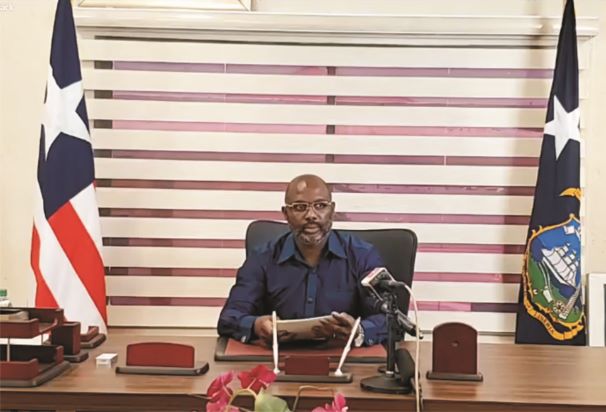Exercising his powers under Article 87 of the Liberian Constitution, President Geroge Manneh Weah on Wednesday, April 8, 2020 announced the state of emergency as a means of stopping the spread of the Coronavirus pandemic and to keep his people safe.
The State of Emergency is due to take effect on Friday, April 10, 2020, but the Liberian leader in his address to the nation did not announce any economic assistance to citizens or payment of civil servants salaries.
Movements of people will be restricted to the communities in which they live and President Weah has forwarded his declaration to the Liberian Legislature for endorsement on Thursday, as the country has now suffered three COVID-19 deaths with three confirmed cases.
“This global pandemic is killing thousands of people around the world. It knows no borders, and there is yet no vaccination or cure. The global spread of this virus represents the greatest threat to the health and well-being of the people of Liberia since the Ebola epidemic suffered by our country from 2014 to 2016. It has already arrived in Liberia, and confirmed cases are now on the rise.”
“THEREFORE, by the Authority granted to me under Articles 85, 86, 87, and 88 of the Liberian Constitution, and after due consultation with the Speaker of the House of Representatives and the President Pro-Tempore of the Liberian Senate, as required by law, I, George Manneh Weah, President of the Republic of Liberia, hereby declare a State of Emergency, to exist in and throughout the Republic of Liberia, for a period of three (3) weeks, renewable until the threat to Liberia from the Covid-19 virus no longer exists.”
Article 87 of the Liberian constitution says:
“a. Emergency powers do not include the power to suspend or abrogate the Constitution, dissolve the Legislature, or suspend or dismiss the Judiciary; and no constitutionals amendment shall be promulgated during a state of emergency. Where the Legislature is not in session, it must be convened immediately in special session and remain in session during the entire period of the state of emergency.
b. The writ of habeas corpus shall remain available and exercisable at all times and shall not be suspended on account of any state of emergency. It shall be enjoyed in the most free, easy, inexpensive, expeditious and ample manner. Any person who suffers from a violation of this right may challenge such violation in a court of competent jurisdiction.”
Details will follow soon.

